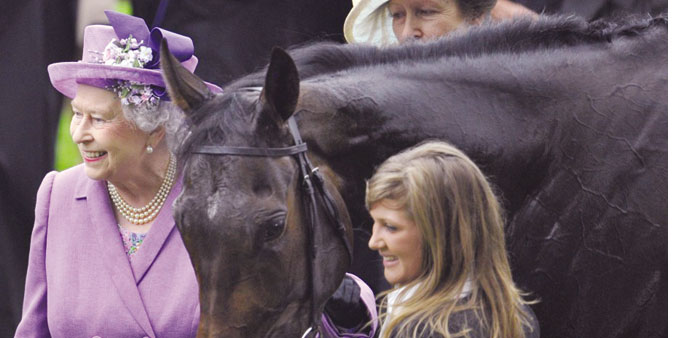Britain’s Queen Elizabeth II poses with Estimate after the mare’s historic win in the Gold Cup last June.
A horse owned by Britain’s Queen Elizabeth II which won one of England’s most prestigious races has failed a drugs test, Buckingham Palace announced Tuesday.
Estimate, which lifted the Gold Cup at Royal Ascot in 2013 and came second in this year’s edition, has tested positive for morphine, a banned substance.
A statement issued by the Queen’s racing advisor said initial indications were the positive test had resulted from the “consumption of a contaminated feed product”.
The Queen, renowned for a love and knowledge of horse racing which dates back to the 88-year-old monarch’s childhood, cheered on Estimate, saddled by top trainer Michael Stoute, when the now five-year-old filly won at Ascot last year.
A statement by John Warren, the Queen’s bloodstock and racing advisor, said: “On Thursday July 17 the British Horseracing Authority (BHA) announced that a number of post-race samples, obtained from recent race meetings, had been found to indicate the presence of morphine, which is a prohibited substance on race days.
“Five horses, under the care of various trainers, were affected.
“I can confirm that one of those horses was Estimate, the five year-old filly trained by Sir Michael Stoute and owned by The Queen.
“Initial indications are that the positive test resulted from the consumption of a contaminated feed product.
“Sir Michael is working closely with the feed company involved to discover how the product may have become contaminated prior to delivery to his stables.
“As the BHA investigates this matter, including potential links between the different cases, Sir Michael continues to offer his full co-operation.
“There will be no further comment until the BHA announces its considered findings.
“Her Majesty has been informed of the situation.”
Morphine is banned by the BHA because it can be used to numb pain. Even though morphine is not deemed to be a performance-enhancing drug, trainer and qualified vet James Given, speaking on Sunday before Estimate was revealed to have failed a test, said it was right it remained banned.
“You are not allowed to use prohibited substances and if you open the door just an inch then it will be kicked open and abused, as we saw last year with anabolic steroids,” he told the At The Races television channel.
Estimate made sporting history for the Queen in 2013 when she became the first reigning monarch to own a Gold Cup-winning horse.
An often reserved figure in public, the Queen was seen smiling as Estimate crossed the winning line first.
Immediately after Estimate’s victory, Stoute said: “It’s a special thrill to win this race for the Queen and it will have given her enormous pleasure—she really loves this game.”
Under the rules of English racing, Estimate will not be stripped of her 2013 Gold Cup victory but she could be deprived of second place in this year’s edition if officials decide there has been an infringement.
Long known as the ‘Sport of Kings’, racing’s connections to royalty date back centuries.
It was Queen Anne in 1711 who first saw the potential for a racecourse at Ascot, south-west of London.
Whilst out riding near Windsor Castle—to this day an official royal residence—she came upon an area of open heath that looked, in her words, “ideal for horses to gallop at full stretch”.
The Gold Cup, a flat race for ‘staying’ horses aged four or older run over a distance of two miles and four furlongs (4,023 metres), was first run in 1807.
Major race victories for the Queen have become increasingly rare in recent decades.
For example, Estimate was the first horse owned by the Queen to win an elite Group One race in Britain since Dunfermline won the Oaks and the St Leger, two of England’s five annual ‘Classics’, in 1977.
Overseas royals from wealthy oil-rich states in the Middle East, such as Dubai ruler Sheikh Mohammed bin Rashid Al Maktoum and Saudi Arabia’s Prince Khalid bin Abdullah, as well as the Ireland-based Coolmore set-up, have all become huge players in English racing after spendingmns of pounds on extensive bloodstock and training operations.

